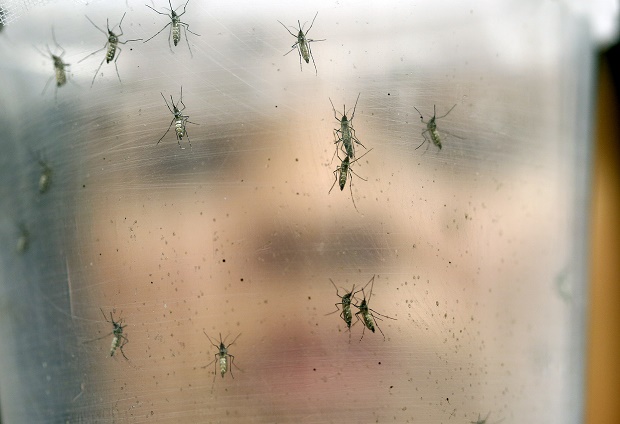Genetically modified mosquitoes combat Zika virus in Brazil

A researcher holds a container with female Aedes aegypti mosquitoes at the Biomedical Sciences Institute in the Sao Paulo’s University, in Sao Paulo, Brazil, Monday, Jan. 18, 2016. The Aedes aegypti is a vector for transmitting the Zika virus. The Brazilian government announced it will direct funds to a biomedical research center to help develop a vaccine against the Zika virus linked to brain damage in babies. AP
SAO PAULO — Genetically modified mosquitoes could help Brazil combat the Zika virus, tests results released Tuesday by a British biotech firm suggest.
The South American nation has been scrambling to contain the spread of Zika, which has been linked to a recent surge in birth defects including microcephaly, a rare condition in which newborns have smaller than normal heads and their brains do not develop properly.
In a statement Tuesday, the Oxitec biotech firm said tests that began in April 2015 have shown that the release of genetically modified sterile male mosquitoes succeeded in reducing a variety of disease-transmitting mosquito larvae by 82 percent by year’s end in a neighborhood of the city of Piracicaba.
READ: El Salvador issues alert against illness-bearing mosquitoes
The Aedes aegypti mosquito also transmits dengue fever and chikungunya.
The genetically modified mosquitoes themselves don’t spread disease because only the females bite.
Piracicaba’s city health department confirmed the tests and results.
Joseph Conlon, a technical adviser for the American Mosquito Control Association, called the results “novel and potentially efficacious.”
Colon said the procedure is not 100 percent effective, but if it is allowed to proceed to full measure, it will “reduce the mosquito population below disease transmission levels with minimal effect on the environment.”
He added that the Aedes aegypti “are notoriously difficult to control by conventional spray methods such as truck or aerial sprays.”
The Brazilian army has been helping in efforts to control the mosquito population by eliminating standing water.
Most of the 3,530 babies the Health Ministry says have been born with microcephaly in the country since October have been concentrated in the country’s poorest regions, such as the northeast. But worries about Zika have prompted residents in wealthier cities such as Rio de Janeiro and Sao Paulo to stock up on mosquito repellent.
Fewer than 150 cases of microcephaly were seen in all of 2014.
READ: Zika virus: US issues travel warning for pregnant women